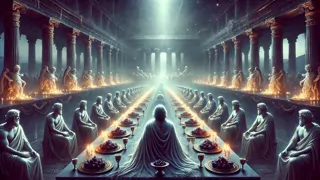Introduction
Beneath the sun-bleached skies and marble columns of ancient Greece, stories moved like river currents, whispering the fates of mortals and gods alike. Among these, one tale lingered on the lips of poets and philosophers, chilling even the most stoic listeners. It was the story of Tantalus, a king of rare privilege, whose seat at the divine banquet table would become the first step toward a torment that outlasted mortal memory. Tantalus was no ordinary man; he was the favored guest of the Olympians, trusted enough to taste ambrosia and sip nectar among gods who rarely welcomed mortals to their feasts. His kingdom of Lydia thrived, lush and golden, its people rich under his rule. Yet, in the heart of Tantalus grew a hunger—one that not even celestial delicacies could satisfy. Pride swelled within him, transforming gratitude into a dangerous certainty that he could outwit even the immortals. It was this spark of arrogance, fanned by envy and a longing to claim the gods’ power for himself, that set in motion his irreversible downfall. The myth of Tantalus is more than a cautionary fable; it is a reflection of the fragile boundary between reverence and defiance, a meditation on the dire consequences of betraying sacred trust. As Tantalus’s crimes mounted—stealing ambrosia, revealing divine secrets, and ultimately committing a horror so grave that the gods themselves recoiled—he sealed his fate not just for a lifetime, but for all eternity. Condemned to Tartarus, he would stand in a pool of clear water with fruit-laden branches swaying above him, forever tormented by thirst and hunger he could never quell. This is the story of Tantalus: his rise, his choices, and the echoing punishment that transformed his name into a byword for endless, unreachable desire.
The Favored King and the Seeds of Hubris
In Lydia’s emerald valleys and sunlit hills, Tantalus ruled with an assured hand. The land yielded generous harvests, rivers sparkled through olive groves, and his people sang hymns of gratitude for their king’s wisdom and strength. Yet, none of Tantalus’s mortal achievements compared to his singular privilege: he alone was invited to dine with the Olympian gods. The first time Tantalus set foot in their radiant halls, he was greeted not as a supplicant but as a guest—an honor that set his heart ablaze. The gods—Zeus with thunder in his eyes, Hera’s regal poise, Apollo’s golden curls—regarded him as a curiosity, a bridge between mortal and divine. They plied him with ambrosia, poured nectar into his goblet, and listened as he spoke of his kingdom’s beauty. For Tantalus, these visits became the axis on which his soul turned. The boundary between mortal king and celestial companion blurred, eroded by the intoxicating sweetness of privilege.

But the gods are keen observers of the human heart. They saw how Tantalus’s humility withered, replaced by an insatiable longing to possess what only immortals could claim. Each time he returned to Lydia, the memory of Olympus gnawed at him. The songs of his people faded into background noise; the glitter of his palace dimmed beside the Olympian halls. At night, he would gaze into the sky, envy twining through his thoughts like smoke. Why should he be bound by mortal limitations? Why not seize the secrets of the gods and secure his own eternal legacy?
The temptation proved too great. Tantalus began to steal, subtly at first—an amphora of nectar tucked beneath his cloak, a handful of ambrosia pressed into his palm. He offered these forbidden treasures to favored guests, whispering of their source. The taste of the divine turned his court wild with excitement; rumors of Tantalus’s special favor spread across Lydia and beyond. Yet, it was not enough. Power and adoration only whetted his hunger. The king’s ambition darkened, his sense of boundaries unraveling. He listened too closely to the murmurs of mortals who begged for signs of the gods’ will. He divulged secrets, betraying sacred trusts for fleeting approval.
The Olympians noticed. Clouds gathered above Lydia, their wrath simmering just beyond the horizon. Tantalus sensed the change but pressed on, believing himself untouchable. His final transgression was an act so monstrous, it would stain his name for generations. To impress the gods and test their omniscience, he invited them to a banquet in his palace. There, he served them a dish crafted from the flesh of his own son, Pelops, believing the gods would never recognize the deception. Horror washed over Olympus as they realized the truth. Demeter, distracted by grief for her lost daughter Persephone, tasted the dish before recoiling. The rest, stricken with revulsion, restored Pelops and turned their judgment upon Tantalus.
He had crossed a boundary that could never be recrossed. His crime—a grotesque blend of hubris, sacrilege, and betrayal—could not be measured by mortal standards. Zeus’s thunder broke the skies, and the king who once feasted with immortals was cast into the shadowy abyss of Tartarus.
Tartarus: The Depths of Eternal Torment
The underworld, as the Greeks imagined it, was no mere shadowland; it was a place of endless geography, its rivers and caverns sprawling beneath the crust of the living world. Tartarus lay deepest of all, a pit far below Hades’ kingdom—a realm reserved for the greatest offenders against cosmic order. Here, Tantalus was thrust, his mortal form stripped of regal adornment, his soul laid bare beneath the cold gaze of chthonic judges.

The punishment crafted for Tantalus was as poetic as it was cruel. He found himself rooted in a pool of crystalline water, clear enough to see the pale stones at its bottom. Above him arched heavy branches of fruit trees—apples, figs, pomegranates—each cluster swollen with impossible ripeness. The air was still, yet perfumed by the promise of sweetness. Hunger gnawed at Tantalus until he could bear it no longer. He reached for a branch, but as his fingertips brushed the fruit, the wind would snatch it higher, just beyond his grasp. When thirst parched his throat, he knelt to drink, and the pool receded from his lips, vanishing into cracked earth. No matter how desperately he lunged or pleaded, sustenance would forever evade him.
Tantalus’s isolation was complete. All around him echoed the wails of other damned souls—Sisyphus groaning beneath his endless boulder, Ixion spinning on a fiery wheel. Yet Tantalus’s agony was unique: it was not pain of fire or physical mutilation, but the endless anticipation of relief that never arrived. He could see what he desired, feel it on the edge of his senses, but some invisible force—a reminder of the gulf between mortal ambition and divine order—kept it always out of reach.
The gods did not ignore him. Occasionally Hermes would appear on the shore, leaning against a willow, his eyes bright with a mixture of pity and warning. ‘You were trusted with the highest gifts,’ the messenger god once said, ‘and you betrayed them for applause. Now you must learn the shape of want that can never be sated.’ Tantalus screamed defiance at first, calling out to Zeus, to Apollo, to any deity who might listen. But the gods’ answers were silence, or the faint crackle of thunder far above the earth.
Seasons passed in a blur of longing. The fruit grew brighter with each failed attempt, the water clearer with every missed sip. Tantalus’s mind twisted in on itself; memories of his palace and people faded, replaced by the ache of perpetual need. At times he saw visions—Pelops restored to life, ruling Lydia in justice, his own name spoken only in warning. He tried to atone with whispered prayers, but the underworld’s laws were unyielding. Redemption would not come through words or regret; it would only arrive, if ever, through the unending lesson of hunger and thirst.
The Echoes of Desire: Lessons from an Endless Punishment
The myth of Tantalus did not end with his damnation; it echoed through generations as both a warning and a meditation on human longing. In the world above, storytellers invoked his fate to explain why some desires remain forever unfulfilled, no matter how fervently one pursues them. His name became the root of ‘tantalize’—the act of showing something beautiful just out of reach. Yet behind this linguistic legacy lay a deeper, more unsettling truth about the costs of ambition divorced from humility.

Tantalus’s punishment was not arbitrary. It reflected the Greek understanding of cosmic balance—how every blessing demands reverence, and every boundary crossed demands reckoning. The gods might grant mortals glimpses of the extraordinary, but those gifts came with expectations of gratitude and restraint. When Tantalus tried to bridge the chasm between human and divine by force, he shattered more than trust; he threatened the order that bound their worlds together. The consequences were not simply for him, but for all who might forget the limits of mortal reach.
For Tantalus himself, eternity in Tartarus became a slow unraveling. He learned to recognize the patterns of his own desire—the surge of hope at each approaching branch, the rush of disappointment as it fled. Over centuries, his defiance burned down to embers. He watched other souls arrive, some raging at their fate, others resigned to it. He saw how each punishment fit its crime: Sisyphus’s futile labor mirrored his sly cunning; Ixion’s wheel spun in answer to betrayal. Tantalus’s torment was uniquely psychological, a mirror for every mortal who ever believed themselves owed more than they had earned.
Yet even in suffering, Tantalus was not erased. The gods allowed Pelops to return, restored and made whole—a gesture that suggested, perhaps, that atonement could reach beyond the individual. Lydia flourished under Pelops’s rule, its people honoring the gods with rituals that remembered both the blessings and the boundaries of divine favor. In time, poets would recount Tantalus’s story not only as a caution but as an invitation to ponder the nature of want: When does desire become destructive? How does one distinguish between ambition and greed? What does it mean to accept one’s place in the order of things?
In the end, Tantalus’s myth remains vital because it resists easy answers. It speaks to anyone who has ever yearned for more—more power, more acclaim, more certainty—only to find that the pursuit itself can become its own form of captivity. The branches will always rise just out of reach; the water will slip away at the moment of greatest thirst. In that space between longing and fulfillment lies the true lesson of Tantalus, echoing down from Olympus and Tartarus alike.
Conclusion
The story of Tantalus endures not only because of its chilling imagery, but because it touches something essential in the human experience. Across time and cultures, people have struggled with ambition, desire, and the temptation to transgress boundaries in pursuit of more—be it knowledge, power, or immortality. Tantalus’s fall from divine favor, his betrayal of sacred trust, and his punishment in Tartarus all serve as reminders that privilege comes with responsibility, and that some boundaries are drawn for good reason. His endless hunger and thirst become metaphors for those longings that, left unchecked, can never truly be satisfied. As long as people seek what lies just out of reach, the myth of Tantalus will remain relevant—a powerful meditation on the limits of human striving and the need for humility before forces greater than ourselves. Through this ancient tale, we are invited not only to marvel at the drama of gods and mortals, but also to reflect on our own desires, ambitions, and the boundaries we must learn to respect if we are to live wisely and well.


















